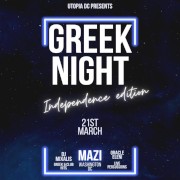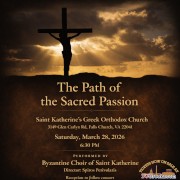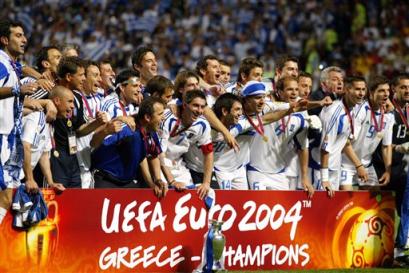|
|
|||||||||||||||
|
UEFA Euro 2004: The Greek Miracle July 6, 2004
The result of that first Saturday, June 12th, 2004, a 2-1 victory over the host Portugal, was a mere footnote in the news. By the following Wednesday, after a come-from-behind 1-1 draw against Spain, it was maybe time to take notice. Things started to seem like they were coming back to normal that next Sunday, with a more familiar outcome, a 2-1 loss against lowly Russia, a game where the Greeks conceded the fastest goal scored in European Cup finals history. But it was the goal by Vryzas in the 43rd minute of the first half that allowed Greece to squeak through to the knockout phase. The Greeks didn’t squander this opportunity, and when they took out the defending champions France 1-0 on Friday, June 25th, and then outlasted the heavily favored Czech Republic in OT to begin July, we finally started to believe. We didn’t want to mention a word about the Greek soccer team before this weekend’s final game in which the team stunned all of Europe, maybe the world, and maybe even itself by winning its first European Championship, after never having won even a single game in the finals of this or any major international tournament. But now, without the ability to jinx what may very well be a once in a lifetime experience for us Greek-Americans, we are free to talk about the significance of this victory as more than just a team of 22 guys winning a game. We can’t tell you what it was like to have been a Greek living in Greece watching this team do the impossible. As Greek-Americans, we’re obviously once removed from what in Greece must have been a national obsession. The closest we’ve ever come to Greek soccer as Greek-Americans was back in 1994 when the Greek World Cup team came to our shores and got absolutely embarrassed, failing to even score in three games. But this team was much different than that team of 10 years ago. This team held on its shoulders the hope of a nation, and we would argue at a time when Greeks and Greek-Americans needed a miracle. If you’ve been following news from Greece this year, it’s been rather discouraging. All we’ve been hearing is how the Greeks aren’t ready for the Olympics, how they procrastinated for three years and are now playing catch up, how everyone is worried about security, and how many days there are left for the Greeks to figure it all out. A couple of months back, Greek soccer, which doesn’t have the greatest of reputations to begin with, was marred with a doping scandal, where one club team was accused of spiking the water bottles of a rival team with a powerful depressant. It was about time that Greek soccer, Greek sport, Greece, and Greek-America in general had something hopeful to rally around. (We miss the days where the Sunday of July 4th weekend was an excuse to miss church and watch Pete Sampras destroy someone in Wimbledon, only to do it again a few months later at the U.S. Open on Labor Day Weekend.) Hearing the story of how a German coach led a modestly talented bunch of Greek players to play disciplined, and at their best sounds like the makings of a sports movie, like Hoosiers, which every cable channel has seemed to want to be running lately. (It was ironic that the Portuguese coach looked a lot like Gene Hackman.) Not being old enough to remember the USA hockey team in 1980 that beat the Soviet Union, inspiring a nation at a time when the U.S. was in the middle of the gas crisis, hostage crisis, and in general bad times, we can only draw upon retellings of the story, like the Disney movie “Miracle” that we didn’t see, but heard enough about earlier this year. This Greek team, coached by an outsider, in beating the host nation Portugal twice both to start and end the tournament, former World Cup and European champion, France, and going into extra time to beat the powerhouse Czech Republic, is worthy of such a place in history, or at least a movie. We paid the $24.95 to get the game on pay-per-view on Sunday, figuring it would be cheaper than an airline ticket to Portugal, which we heard was the choice of at least one die-hard fan here in the D.C. area. Even though we’ll soon hopefully hear the Greek National Anthem more times this summer than we did in six years of Greek school, it still sent chills down our spine to hear it at the beginning of that game. It was inspiring to see a sea of blue and white drowning out the majority of the red and green clad Portuguese fans who probably couldn’t believe that the score wasn’t 3-0 Portugal by halftime. If things were supposed to go as planned, the first game where Greece beat Portugal would have been considered a fluke, awaking the giant, who should have smacked Greece around in their second meeting. (It’s hard to beat a good team two times in a row in any sport, let alone in their home stadium.) When the score was 0-0 at halftime, we were encouraged, but still didn’t want to get our hopes up. (Our thea back in Athens didn’t even watch a single minute of the game, she was so nervous.) We never expected that Greece would be the first to score, and off of such a clean Angelos Charisteas header from a corner kick. These are routine plays that great teams make against bad teams, but somehow, at least over the course of the last three weeks, Greece had become a great team. The last 33 minutes of that game were spent hoping that the great Greek letdown wasn’t about to set in. When an unruly Portuguese fan jumped onto the field, and raced into the Greek net, scoring a “goal” before getting pummeled by security, we figured this was going to spell the end of the Greek hopes. As expected, the referees added more time to the game, a full five minutes, and we figured that it was going to be in the predictable 93rd or 94th minute of the game when Portugal would score a goal, forcing overtime, and then they’d come back to win the game. But for once, that didn’t happen. Greece actually won something. A nation and a diaspora was for once left celebrating and not blaming everyone else for their shortcomings. It was a refreshing feeling to say the least. In a few days after the celebrations have ended, the world will go back to normal, the countdown to the Olympics will continue, and the world will probably again focus its attention on everything that’s wrong with the Greek nation. But for those of us who paid attention and remembered those three weeks at the end of June and beginning of July, it will be our miracle.
|




